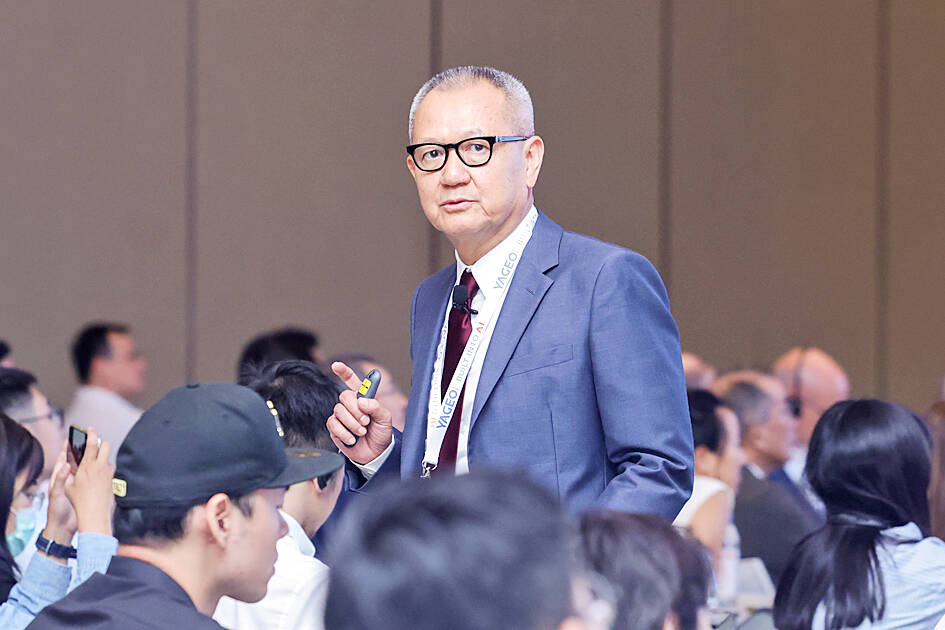Yageo Corp (國巨), one of the world’s top three passive component suppliers, said its products have been widely used in artificial intelligence (AI) applications, including servers powered by Nvidia Corp’s AI chips, which has helped to boost its AI-related business’ revenue contribution to about 5 percent.
This growing revenue from AI has been one of Yageo’s major achievements of the past six years, as the company transforms itself into a premium passive component supplier and shakes off cut-throat price competition from Chinese rivals in the standard components segment, Yageo chairman Pierre Chen (陳泰銘) told reporters on the sidelines of an AI summit arranged by the company in Taipei on Thursday.
Yageo has also dramatically reduced China’s revenue contribution to about 24 percent last year, versus as high as 78 percent in 2017, Chen said.

Photo: CNA
As part of its efforts to expand its product spectrum, Yageo dived into the AI sector about five years ago, concentrating on developing components and technologies to enhance power efficiency for AI applications, Chen said.
In Taiwan, Yageo has risen to become the largest supplier of X6S multilayer ceramic capacitors (MLCC), a high-capacity MLCC that is used in AI servers, Chen said.
“We have been deeply involved in the AI [sector]… Yageo will not be absent from any areas linked to AI applications,” he said.
“A majority of the market’s main AI players are our customers from Taiwanese assemblers to overseas AI companies,” he added.
As a long-term supplier to Nvidia, Yageo has also expanded its ability to supply high-capacity MLCCs for Nvidia’s latest and most powerful GB200 superchip through companies on Nvidia’s approved vendor list, the company said.
Global hyperscalers such as Amazon.com Inc and tech giants such as Meta Platforms Inc and Microsoft Corp are keen on investing in servers and data centers to help customers doing AI training and referencing over the next few years.
Chen said that he expected Yageo to benefit from this AI boom.
Yageo develops passive components to enhance power management and power efficiency for customers’ AI products to address the power consumption issue, it said.
Last year, Yageo was the world’s biggest producer of polymer tantalum, which is mainly used in AI servers.
Aside from servers, Yageo’s components also can be found in a wide range of chips that are used in laptops, accelerator cards, switches and autonomous vehicles.
“Yageo now is not the company as it was known 10 years ago,” Chen said.
The MLCC business only accounts about 17 percent of the company’s total revenue, as it has broadened its product portfolios through a series of mergers and acquisitions, Chen said.
In 2017, it accounted for half of the company’s overall revenue.
Magnetic components were Yageo’s biggest revenue source at 30 percent during the first half of this year, company data showed.
As supply chain management becomes an increasingly complicated challenge, Yageo has been tasked to provide a total solution to customers, Chen said.
Passive components only make up a mere 5 percent of customers’ component costs, he added.

Sweeping policy changes under US Secretary of Health and Human Services Robert F. Kennedy Jr are having a chilling effect on vaccine makers as anti-vaccine rhetoric has turned into concrete changes in inoculation schedules and recommendations, investors and executives said. The administration of US President Donald Trump has in the past year upended vaccine recommendations, with the country last month ending its longstanding guidance that all children receive inoculations against flu, hepatitis A and other diseases. The unprecedented changes have led to diminished vaccine usage, hurt the investment case for some biotechs, and created a drag that would likely dent revenues and

Macronix International Co (旺宏), the world’s biggest NOR flash memory supplier, yesterday said it would spend NT$22 billion (US$699.1 million) on capacity expansion this year to increase its production of mid-to-low-density memory chips as the world’s major memorychip suppliers are phasing out the market. The company said its planned capital expenditures are about 11 times higher than the NT$1.8 billion it spent on new facilities and equipment last year. A majority of this year’s outlay would be allocated to step up capacity of multi-level cell (MLC) NAND flash memory chips, which are used in embedded multimedia cards (eMMC), a managed

CULPRITS: Factors that affected the slip included falling global crude oil prices, wait-and-see consumer attitudes due to US tariffs and a different Lunar New Year holiday schedule Taiwan’s retail sales ended a nine-year growth streak last year, slipping 0.2 percent from a year earlier as uncertainty over US tariff policies affected demand for durable goods, data released on Friday by the Ministry of Economic Affairs showed. Last year’s retail sales totaled NT$4.84 trillion (US$153.27 billion), down about NT$9.5 billion, or 0.2 percent, from 2024. Despite the decline, the figure was still the second-highest annual sales total on record. Ministry statistics department deputy head Chen Yu-fang (陳玉芳) said sales of cars, motorcycles and related products, which accounted for 17.4 percent of total retail rales last year, fell NT$68.1 billion, or

In the wake of strong global demand for AI applications, Taiwan’s export-oriented economy accelerated with the composite index of economic indicators flashing the first “red” light in December for one year, indicating the economy is in booming mode, the National Development Council (NDC) said yesterday. Moreover, the index of leading indicators, which gauges the potential state of the economy over the next six months, also moved higher in December amid growing optimism over the outlook, the NDC said. In December, the index of economic indicators rose one point from a month earlier to 38, at the lower end of the “red” light.